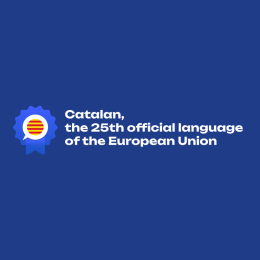Now that the official status of Catalan in the EU is on the political agenda and the Spanish government has taken the first step towards making this happen, Plataforma per la Llengua is announcing the launch of a website to promote recognition of the language, along with an intensive campaign over the next three months.
The Catalan NGO holds the Spanish government responsible for the negotiations needed to persuade the other 26 EU countries accept Catalan as an official language, and asks citizens to support the campaign via catalaoficial.eu.
The organisation is announcing actions both involving the language itself and in the heart of Europe, particularly before the meetings on 19 September and 23 October, when the EU Council can deliberate on the request for official status.
Every day on the website, Plataforma per la Llengua will publish a negative consequence of Catalan not having official status and it is appealing to people to sign up and strengthen the campaign with a donation. The Catalan NGO has set itself the target of obtaining at least €15,000. With this money it will be able to publicise the benefits of official status with a variety of visible actions. It will also be able to work to persuade diplomats from the EU states to accept Catalan as an official language.
The website also includes a section of frequently asked questions providing answers on various aspects of official status, the effects of being an official EU language and various elements that help compare the current position of Catalan with other similarly sized official languages, and even some with fewer speakers.
The opportunity of the Spanish EU presidency
The rotating presidency of the EU, held by Spain until the end of the year, is a good window of opportunity to achieve this historic demand, as the Spanish State now has greater negotiating capacity than it usually does.
Plataforma per la Llengua is calling on the Spanish government to make use of this favourable position to obtain the acceptance of the other the countries of the Union to add Catalan to the list of official languages under Regulation 1/1958. That is why, in an opinion article in El Periódico de Catalunya by the president of Plataforma per la Llengua, Òscar Escuder, the organisation asked the Spanish government to make public the memorandum it will present to the EU Council together with the details and the reasoning backing the request to make Catalan official.
The year to push for official status
Plataforma per la Llengua has promoted several actions to press for official status. On 27 June, three days before the start of the six-month Spanish presidency of the EU, the organisation held a public event in Barcelona to explain the benefits and feasibility of official status. On the first day of the Spanish presidency, on 1 July, the organisation announced that it had obtained a written confirmation from the EU confirming that Spain had never requested official status for Catalan in the EU, contrary to the statement of Foreign Minister José Manuel Albares in the Spanish Parliament in September 2021. This initiative was carried out jointly with Sinn Fein's Irish MEP Chris MacManus.
A few days later, Plataforma per la Llengua published the letter its president Òscar Escuder had sent to Spanish Prime Minister Pedro Sánchez to request official status for Catalan. It also informed MEPs of the demand and the situation of Catalan, as well as projecting a giant poster on the facade of Barcelona City Hall to ask for Mayor Jaume Collboni's commitment to the request.
In February, a manifesto in favour of official status promoted by Plataforma per la Llengua, Òmnium Cultural, Acció Cultural del País Valencià, FemCat, Intersindical-SCC, Obra Cultural Balear, the Institut d'Estudis Eivissencs and Obra Cultural Balear de Formentera gathered backing from more than 70 organisations, including the Barcelona Football Club and the Barcelona Medical Association, as well as the support of more than 50,000 individuals.




